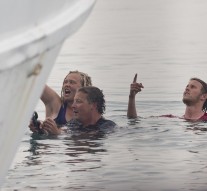
New Group of Migrants Transferred to Turkey amid Resistance
Migration 8 April 2016A new group of 45 migrants from Pakistan has been transferred by ferry from the Greek island of Lesvos to Turkey.
As an attempt to stop the transfer, four demonstrators jumped into the water, while two of them hung on to the chain of the anchor of the ferry.
Coastguards managed to fish them out of the water and they were eventually detained.
Implement the EU-Turkey Agreement
As established under the recent EU deal with Turkey, all migrants arriving illegally in Greece after 20 March will be sent back to Turkey if they do not apply for asylum or if their claim is rejected. A special case is made for Syria’s refugees, as the EU promised to take a Syrian who has made a legitimate request in exchange of each Syrian migrant returned to Turkey.
The returns arrangement has been criticised by human rights groups, who claim Turkey is not a safe country for migrants.
For more information, read “EU-Turkey Deal: is Europe Doing the Right Thing?”
Nevertheless, the country’s struggling national asylum service has been overwhelmed by the surge of new applicants and threatens to stall the returns process to Turkey.
According to Greek migration officials, the majority of latest asylum claims were submitted by migrants in detention centres on the islands of Lesbos, Chios and Samos. Other few applications were filed electronically through Skype by people staying at open camps on the mainland.
The Migrants Tides are Moving… Or Maybe Not at All?
Data from the International Organization for Migration show that the number of migrant arriving in Greece from Turkey by Sea have dropped sharply, from around 2000 per day early last month to some hundreds this month.
Concern is raised in Italy over increased arrivals through the Mediterranean.
Now prevented from reaching Greece, migrants might try to enter the EU from North Africa instead.
Meanwhile, some 11,000 migrants are still camped at Greece’s border with Macedonia, blocked on their way to other EU countries.


